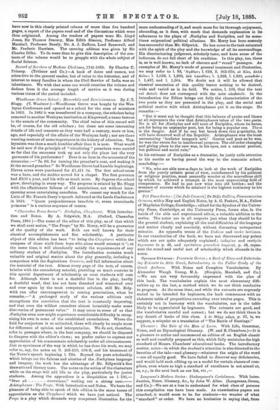"Clarendon Press Series": .Eschylus, Cluxphoroi. With Introduc- tion and Notes.
By A. Sidgwick, M.A. (Oxford, Clarendon Press, 1884)—The name of the editor of this play, as of that which we shall next notice, "The Frogs," by Mr. Merry, will be a guarantee of the quality of the work. Both are well known for their classical accomplishments and fine scholarship. A particular object of this edition has been "to bring the Choxphoroi within the compass of those sixth-form boys who alone would attempt it "; at the same time, it will abundantly satisfy the requirements of any ordinary student of .2Eschylas. The Introduction contains much valuable and original matter about the play generally, including a comparison with the Sophoklean Oresteia, and full information about the material of the text. Almost every page of the text, of coarse, bristles with the emendatory asterisk, providing as much exercise in this special department of scholarship as most students will care for. Although there is not a doubtful line in the play, hardly a doubtful word, that has not been threshed and winnowed over and over again by the most competent scholars, still Mr. Sidg- wick can offer encouragement to coming generations, when he remarks,—" A prolonged study of the various editions only strengthens the conviction that the text is constantly improving, and that even the wildest emenders almost invariably make some discoveries of permanent value." It may occur to some of us that 2Eschylas even now might experience considerable difficulty in recog- nising his own in some of the established emendations. Where the field for conjecture is so unlimited, there will clearly be ample room for difference of opinion and interpretation. We do not, therefore, refer to passages where, in the best company, we should be disposed to disagree with the editor's views ; we prefer rather to express our appreciation of his consummate scholarship under all circumstances. Just as specimens of the way in which he has done his work, we may refer to, say, the notes on 11. 205-210, 698-9, and his treatment of the Nurse's speech beginning 1. 734. Beyond the pure scholarship which brings out the fulness and niceties of the Aschylean language and imagery, the work has the advantage of Mr. Sidgwiok's fine dramatic and literary taste. The notes on the action of the characters while on the stage will add life to the play, particularly for junior students. Among the appendices is a disquisition on 1. 196, —
"Swan KlYtICrediAliv," making out a strong case.— Ariatophanes : The Frogs. With Introduction and Notes. We have the pleasure of being able to speak of this edition in the same terms of appreciation as the Chaphoroi which we have jest noticed. The Frogs is a play which demands very competent illustration for the mere understanding of it, and much more for its thorough enjoyment, abounding, as it does, with much that demands explanation in its references to the plays of Aschylus and Euripides, and its some- times enigmatical political allusions. Mr. Merry has been scarcely less successful than Mr. Sidgwiok. He has come to the task saturated with the spirit of the play and the knowledge of all its surroundings. His discriminating judgment, scholarly taste, and keen sense of the ludicrous, do not fall short of his erudition. In this play, too, there is, as is well known, no lack of obscure and " vexed " passages. As examples of Mr. Merry's mode of general treatment and illustration, we may refer to 1. 83, ' A-yciecuy; 1. 610, 11. 965-970, of, Kies, laltic Keios ; 1. 1,028, 1. 1,200, ATI: maa•Olov ; 1. 1,323, I. 1,330, /101,0)81Ggi 1. 1,437, and I. 1,504. We doubt not it will be allowed that classical annotation of this quality leaves nothing to be desired, wide and varied as is its field. We notice, 1. 595, that the text sal fiaARIs does not correspond with the note ducflaxiis. In the Introduction the Editor brings out fully the characteristics of the two poets as they are presented in the play, and the social and political motive with which Aristophanes put it on the stage. He remarks :—
" Bat it mast not be thought that this balance of praise and blame at all represents the view that Aristophanes takes of the two poets. He is all for 2Eschylus and will none of Euripides, whom he hates, not for being an unpopular poet, but for being a popular one. There is the danger. And if he can bat break down this p3palarity, he will have deserved well of the Republic. Aristophanes was the most unreasoning Ito:Watt:or temporis acti.' Genius and poet as he was, he was the sworn foe to intellectual progress. The old order changing and giving place to the new was, in his eyes, not a natural process, • but political and social ruin."
In his estimate of Euripides as a dramatist, he justly calls attention to his merits as having paved the way to the romantic school, concluding :— " We, who are able now-a-days to look at the work of Euripides from the purely artistic point of view, uninfluenced by his political or religions position, must assuredly wonder at the marvellous skill by which he achieved a triumph in the most unpromising field of compromise. He had to put new wine into old bottles ; and the measure of success which he attained is the highest testimony to his genius."


































 Previous page
Previous page